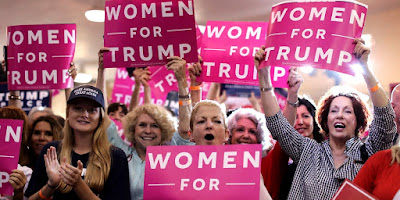 Here's an excerpt from an article I recently read, "How Women in Media Missed the Women’s Vote," from the December 18th issue of City Journal:
Here's an excerpt from an article I recently read, "How Women in Media Missed the Women’s Vote," from the December 18th issue of City Journal:The election itself, pitting a credentialed feminist godmother against a rude Alpha male, was the best gift of all. The Hollywood Access tape, in which Trump could be heard boasting of grabbing women’s private parts; the steady march of women who came forward to accuse Trump of abuse; the disgust of some high-level Republican women, from Ted Cruz staffer Amanda Carpenter to New Hampshire senator Kelly Ayotte: the articles could practically write themselves. And so they did: a slew of titles like “Republican Women Are Done with Trump,” (Politico’s Katy Glueck) and “Republican Women Feel Betrayed by Their Party” (Slate’s Michelle Goldberg) popped up like so many weeds after a thunderstorm.
Still, even as Trump looked headed for defeat, the experts’ gender-identity politics was leading them astray. Plenty of women were not done with Trump. That’s not to say that they didn’t mind the candidate’s “locker room talk.” But, not filtering all reality through the framework of “patriarchy” or “male privilege,” they didn’t see it as disqualifying. Excellent women reporters like Salena Zito and Molly Ball did go to the hinterlands and listen carefully to what women there were saying, without imposing their own priors on them; they weren’t shocked to learn later that 92 percent of Republican women wound up voting for Trump.
But the media’s anointed experts on women couldn’t see it. Gender-identity politics requires its practitioners to use the oppression of women as the organizing principle for interpreting the world. All issues can be understood as a version of this Manichean struggle—in the case of the 2016 election, between feminism and misogyny. Relying on a theory from Democratic pollster Celinda Lake, Goldberg argued that women were voting for Trump because they depended on their husbands and did what they were told. Both Lake and Goldberg failed to notice that “glass ceiling,” “harassment,” and even “equal pay” didn’t rank with the main sources of working-class discontent such as jobs, the cost of health-care premiums, and terrorism.
Working-class and other Trump-leaning women, much like their male counterparts, are well aware that media elites sneer at them (when they bother thinking about them). So great is their suspicion of their self-appointed betters that instead of being appalled by Trump stories, some assumed that the stories were planted. “I think this is the Clinton campaign,” Karen Diehl the co-owner of a southern Ohio insurance company and sometime Republican activist told me when I asked about the lurid Trump headlines. “The media wants her to win.”
In the end, the gender-identity politicos’ assumption that they were speaking for “women” only served to accentuate the class, education, and geographic divide that they already personified. The election’s aftermath does not suggest that they’re interested in reflecting on that divide. Instead of trying to find out why so many women failed to conform to their model of the world, they have burrowed back down into gender theory. Emily Crockett, Vox’s “staff writer on gender,” explained “Why Misogyny Won.” Buzzfeed’s Ann Helen Peterson lamented, “This is How Much America Hates Women.” As for Trump-voting women, they were obviously mindless and self-deluded. The election results reveal “internalized misogyny,” wrote New York’s Rebecca Traister, a phrase repeated on MSNBC by Jess McIntosh, director of communications for Emily’s List.
For pure self-delusion, no one could beat Clinton surrogate and Manhattan-raised, Oberlin-educated media darling Lena Dunham, the most famous of the gender experts. Dunham rued the “white women, so unable to see the unity of female identity, so unable to look past their violent privilege, and so inoculated with hate for themselves.” She continued: “It wasn’t supposed to go this way. It was supposed to be her [Clinton’s] job. She worked her whole life for the job. It’s her job.”
Like her comrades in gender-identity politics, the Girls creator and star doesn’t know much about “women,” but she has a Ph.D. in privilege.


No comments:
Post a Comment